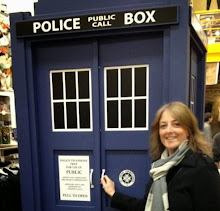Thursday, May 31, 2007
What type of technology user are you?
 So, are you an omnivore, a connector or a productivity enhancer? Do you feel connected, but hassled; light, but satisfied; or just plain indifferent? Do you know someone who’s completely off the network?
So, are you an omnivore, a connector or a productivity enhancer? Do you feel connected, but hassled; light, but satisfied; or just plain indifferent? Do you know someone who’s completely off the network?These are some of the ten distinct groups of users that a recent PEW Internet Study discovered when researching the assets, actions and attitudes of Americans toward information and communication technology (ICT).
The ten groups fit broadly into three categories: high-end or “elite” tech users comprising 31% of American adults, medium or “middle of the road” tech users consisting of 20%, and low-level adopters or those with “few tech assets”, accounting for a whopping 49% of American adults.
Elite Tech Users (31% of American adults)
Omnivores 8% - They have the most information gadgets and services, which they use voraciously to participate in cyberspace and express themselves online and do a range of Web 2.0 activities such as blogging or managing their own Web pages.
Connectors 7% - Between featured-packed cell phones and frequent online use, they connect to people and manage digital content using ICTs – all with high levels of satisfaction about how ICTs let them work with community groups and pursue hobbies.
Lackluster Veterans 8% - They are frequent users of the internet and less avid about cell phones. They are not thrilled with ICT-enabled connectivity.
Productivity Enhancers 8% -They have strongly positive views about how technology lets them keep up with others, do their jobs, and learn new things.
Middle-of-the road Tech Users (20%)
Mobile Centrics 10% - They fully embrace the functionality of their cell phones. They use the internet, but not often, and like how ICTs connect them to others.
Connected But Hassled 10% - They have invested in a lot of technology, but they find the connectivity intrusive and information something of a burden.
Few Tech Assets (49%)
Inexperienced Experimenters 8% - They occasionally take advantage of interactivity, but if they had more experience, they might do more with ICTs.
Light But Satisfied 15% - They have some technology, but it does not play a central role in their daily lives. They are satisfied with what ICTs do for them.
Indifferents 11% - Despite having either cell phones or online access, these users use ICTs only intermittently and find connectivity annoying.
Off the Network 15% - Those with neither cell phones nor internet connectivity tend to be older adults who are content with old media.
This study provides a wealth of information for private sector marketing as well as service planning in the public sector. The fact that almost half of adult Americans make little or no use of ICT, demonstrates that service delivery in the public sector cannot exclude traditional methods, such as television, radio, newspapers and telephone. At the other end of the spectrum, however, are the so-called “elite” for whom ICT is a core component of their lives and who expect ICT to provide all the information and services they require.
Some interesting results about demographics, gender and ethnicity were revealed as well. The typical “omnivore” is a young male in his twenties, while the typical “connector” is a female in her late thirties. “Lackluster veterans” are predominantly white, while “omnivores” are an ethnically diverse group. As exposure to broadband, wireless and other information technologies increasingly happens in schools, the more tech-oriented groups tend to be higher-educated. Not surprisingly, the most tech-oriented groups tend to be decades younger than the least tech-oriented groups.
Given the high adoption rate of cell phone use across all categories, one would expect the availability of WAP-enabled websites and web-based services to increase. Conversely, about 15% of adult Americans don’t have a cellphone and never go online. This “off the network” group, who are in their 60’s and older, are likely to live a long time and are the least likely to transition into new technologies.
While the elites are showing the way of the future, there are a significant number of people with few tech assets who will still require traditional methods of service delivery for many years to come.
Posted by Sharon E. Herbert at Thursday, May 31, 2007
Labels: Cell phones, Demographics, Internet, PEW Internet Study, Public Service, Technology, Users
Subscribe to:
Post Comments (Atom)





2 comments:
Cripes! that makes me a connector - who'd have thought??
I LOVE the new technology - and to think I used to be a ludite :)
The purpose is communication, right? Technology is best when it approaches the Degree Zero (pace Bartes)...
Post a Comment